

Bhagavad-gita As It Is Chapter 2 Verse 47. Bhaktivedanta VedaBase: Bhagavad-gita As It Is 2.47 karmany evadhikaras te ma phaleshu kadacana ma karma-phala-hetur bhur ma te sango 'stv akarmani karmani -- in prescribed duties; eva -- certainly; adhikarah -- right; te -- of you; ma -- never; phaleshu -- in the fruits; kadacana -- at any time; ma -- never; karma-phala -- in the result of the work; hetuh -- cause; bhuh -- become; ma -- never; te -- of you; sangah -- attachment; astu -- there should be; akarmani -- in not doing prescribed duties.
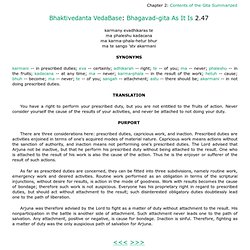
You have a right to perform your prescribed duty, but you are not entitled to the fruits of action. There are three considerations here: prescribed duties, capricious work, and inaction. As far as prescribed duties are concerned, they can be fitted into three subdivisions, namely routine work, emergency work and desired activities. Arjuna was therefore advised by the Lord to fight as a matter of duty without attachment to the result. Bhagavad-gita As It Is Chapter 2 Verse 47. Bhagavad-gita As It Is Chapter 2 Verse 59. Bhaktivedanta VedaBase: Bhagavad-gītā As It Is 2.59 viṣayā vinivartante nirāhārasya dehinaḥ rasa-varjaḿ raso 'py asya paraḿ dṛṣṭvā nivartate viṣayāḥ — objects for sense enjoyment; vinivartante — are practiced to be refrained from; nirāhārasya — by negative restrictions; dehinaḥ — for the embodied; rasa-varjam — giving up the taste; rasaḥ — sense of enjoyment; api — although there is; asya — his; param — far superior things; dṛṣṭvā — by experiencing; nivartate — he ceases from.
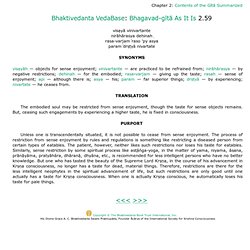
The embodied soul may be restricted from sense enjoyment, though the taste for sense objects remains. Unless one is transcendentally situated, it is not possible to cease from sense enjoyment. Copyright © The Bhaktivedanta Book Trust International, Inc.His Divine Grace A. Narada Bhakti Sutra Narada Bhakti Sutra Chapter 2 Verse 26. Bhaktivedanta VedaBase: Nārada Bhakti Sūtra 26 phala-rūpatvāt phala — of the fruit; rūpatvāt — because of being the form.
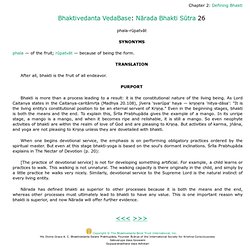
After all, bhakti is the fruit of all endeavor. Bhakti is more than a process leading to a result: it is the constitutional nature of the living being. As Lord Caitanya states in the Caitanya-caritāmṛta (Madhya 20.108), jīvera 'svarūpa' haya — kṛṣṇera 'nitya-dāsa': "It is the living entity's constitutional position to be an eternal servant of Kṛṣṇa. " When one begins devotional service, the emphasis is on performing obligatory practices ordered by the spiritual master. [The practice of devotional service] is not for developing something artificial. Nārada has defined bhakti as superior to other processes because it is both the means and the end, whereas other processes must ultimately lead to bhakti to have any value.
THIS IS THE HOME PAGE OF SRI S. The Upanishads : Paramanande, Swami. Hindu_Scriptures. (1904-1967) Scientist, philosopher, bohemian, and radical.
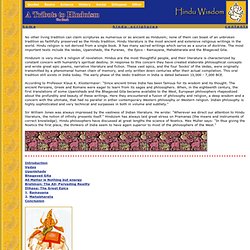
A theoretical physicist and the Supervising Scientist Manhattan Project, the developer of the atomic bomb said: "Access to the Vedas is the greatest privilege this century may claim over all previous centuries. Modern man is a diminished man. Despite the superficial excitements of our high-tech world, life for most has become a flat, stale, and joyless thing. It is joyless because we have forgotten what life is supposed to be. Dr. "The Vedas stand in all their might and majesty as the very source and bedrock of Hindu civilization. (source: Essays on Hinduism - By Karan Singh p. 50. Prof. "The Vedas represent the pinnacle of the oldest literature of India. Pandit Madan Mohan Malviya (1861 – 1946) was a great Indian nationalist and a true propounder of Hindu culture and often called as the Teacher of the Nation, has said: Hinduism. Sacred-texts home Journal Articles: Hinduism OCRT: Hinduism Buy CD-ROM Buy books about Hinduism Vedas Upanishads Puranas Other Primary Texts Epics Mahabharata Ramayana Bhagavad Gita Vedanta Later texts Modern books The Vedas There are four Vedas, the Rig Veda, Sama Veda, Yajur Veda and Atharva Veda.
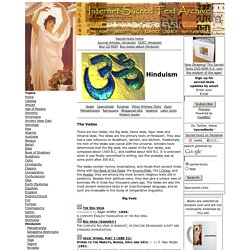
The Vedas are the primary texts of Hinduism. They also had a vast influence on Buddhism, Jainism, and Sikhism. The Vedas contain hymns, incantations, and rituals from ancient India. Rig Veda The Rig-Veda translated by Ralph Griffith [1896]A complete English translation of the Rig Veda. Rig-Veda (Sanskrit)The complete Rig Veda in Sanskrit, in Unicode Devanagari script and standard romanization. Vedic Hymns, Part I (SBE 32)Hymns to the Maruts, Rudra, Vâyu and Vâta, tr. by F. Vedic Hymns, Part II (SBE 46)Hymns to Agni, tr. by Hermann Oldenberg [1897]The Vedic Hymns to Agni. A Vedic Reader for Students (excerpts) by A.A. Sama Veda Yajur Veda.